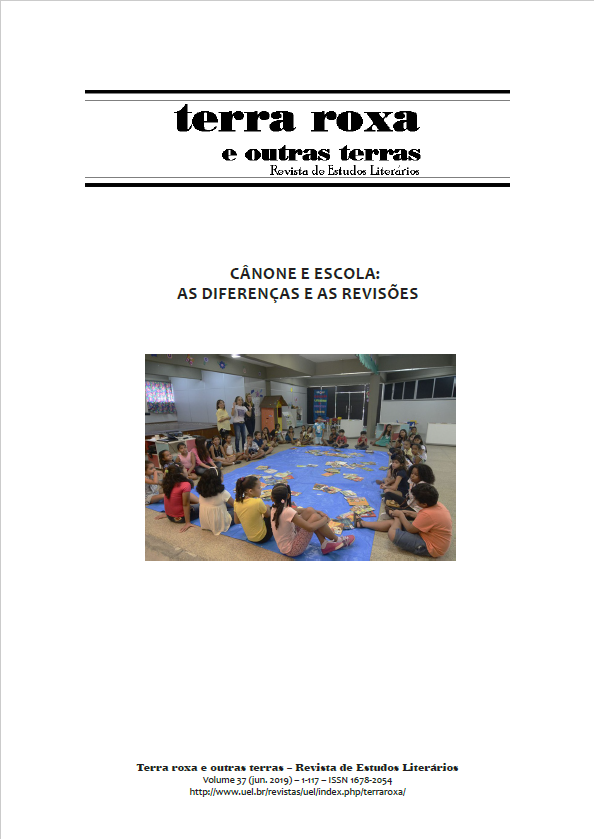Africanizing literacy to africanize the school curriculum
DOI:
https://doi.org/10.5433/1678-2054.2019v37p8Keywords:
Literacy, Afro-literacy, Literature in literacy, AfrocentrismAbstract
The concept of literacy proposed in the school curriculum is no longer enough to represent the singularities of all the subjects participating in the teaching-learning process, nor to follow the multicultural diversity and the technological transformations with which these individuals need to relate.Therefore, from the perspective of a curricular proposal that considers an Afrocentric view, we present a brief study on "Afro-literacy". At the outset, we draw a historical review of the concept of literacy in the works of Kleiman (1995), Soares (1998) and Rojo (2009), and then analyze two recent concepts, "Afrocentrism" and "Afro-literacy" by Nogueira Júnior (2010) and Nascimento (2016). These theoretical approaches are contextualized from social policies directed in particular to the black population in Brazil, as well as the proposals of legal bases in education, created since 1995 up to 2005. And, finally, we seek to exemplify a mode of curricular insertion of Afrocentric features, using non-canonical texts of black-Brazilian writers such as Cristiane Sobral and Conceição Evaristo.Downloads
References
BRASIL. Ministério da Educação: Secretaria de Educação Básica. Orientações curriculares para o ensino médio. Linguagens, códigos e suas tecnologias. Brasília: MEC, 2006.
COLOMBO, Renan. "A dificuldade de ensinar temas afro-brasileiros". Gazeta do Povo (Curitiba), Educação, p. 11, 16 mar. 2010.
CUTI. [Luiz Silva]. Literatura negro-brasileira. São Paulo: Selo Negro, 2010.
DIJK, Teun A. van (org). Racismo e discurso na América Latina. 2. ed. São Paulo: Contexto, 2012.
DUARTE, Eduardo de Assis. "O Bildungsroman afro-brasileiro de Conceição Evaristo". Estudos Feministas (Florianópolis), v. 14, n.1, pp. 305-308, jan./abr. de 2006.
EVARISTO, Conceição. Ponciá Vicêncio. 2.ed. Belo Horizonte: Mazza, 2005.
KLEIMAN, Ângela B. Os significados do letramento: uma nova perspectiva sobre a prática social da escrita. Campinas: Mercado de Letras, 1995.
NASCIMENTO, Elisabete. Afroletramento docente. Afrocentricidade. 26 out. 2010. Disponível em <http://alb.com.br/arquivo-morto/portal/5seminario/PDFs_autores/Elisabete_Nascimento.pdf>. Acesso 19 jul. 2016.
NASCIMENTO, Elisa Larkin (org.). Afrocentricidade: uma abordagem epistemológica inovadora. São Paulo: Selo Negro, 2009.
NOGUEIRA JÚNIOR, Renato. Afrocentricidade e educação: os princípios gerais para um currículo afrodescendente. África e Africanidades, n. 11, 2010. Disponível em <http://www.africaeafricanidades.com.br/documentos/01112010_02.pdf>. Acesso 19 jul. 2016.
ROJO, Roxane. Letramento(s) - práticas de letramentos em diferentes contextos. Roxane Roxo (org.). Letramentos múltiplos, escola e inclusão social. São Paulo: Parábola, 2009, pp. 95-127.
SOARES, Magda. Letramento: um tema em três gêneros. 2. ed. Belo Horizonte: Autêntica, 1998.
SOBRAL, Cristiane. Não vou mais lavar os pratos. 3ª. ed. Brasília: Athalaia, 2016.
SUPLICY, Eduardo Matarazzo. "Mais liberdade ao cidadão". Folha de S. Paulo (São Paulo), p. A3 , 25 jun. 2016.
WERNECK, Jurema. "Introdução". Conceição Evaristo. Olhos d'água. Rio de Janeiro: Pallas, 2014, pp. 13-14.
Downloads
Published
How to Cite
Issue
Section
License
Copyright (c) 2019 Terra Roxa e Outras Terras: Revista de Estudos Literários

This work is licensed under a Creative Commons Attribution 4.0 International License.
Authors who publish in this journal agree to the following terms:
a) The authors retain the copyright and grant the journal the right of first publication, the work being simultaneously licensed under the Creative Commons Attribution-NonCommercial 4.0 International License, allowing the sharing of the work with acknowledgment of the authorship of the work and initial publication in this journal.
b) Authors are authorized to assume additional contracts separately, for non-exclusive distribution of the version of the work published in this journal (eg, publish in an institutional repository or as a book chapter), with acknowledgment of authorship and initial publication in this journal.
c) Authors are allowed and encouraged to publish and distribute their work online (e.g. in institutional repositories or on their personal page) after the editorial process, as this can generate productive changes as well as increase impact and citation of the published work (See The Effect of Open Access).
d) The authors of the approved works authorize the journal to, after publication, transfer their content for reproduction in content indexers, virtual libraries and the like.
e) The authors assume that the texts submitted for publication are of their original creation, taking full responsibility for their content in case of any objection by third parties.



















